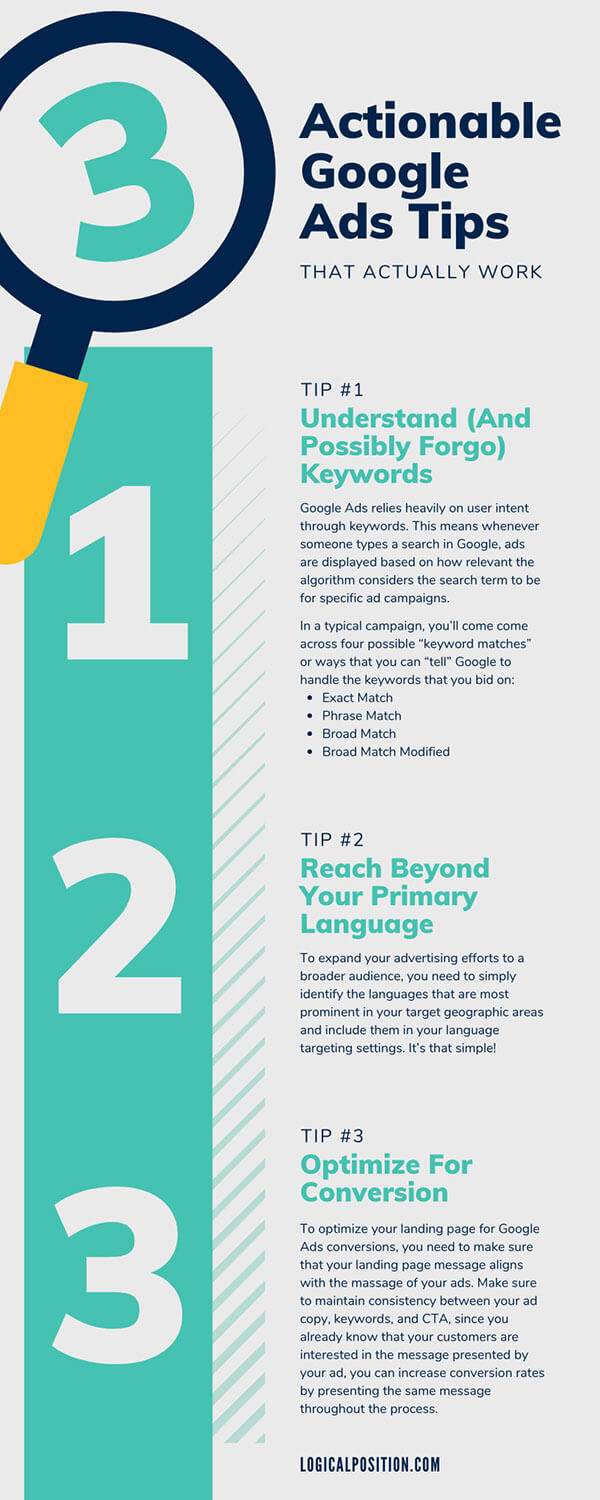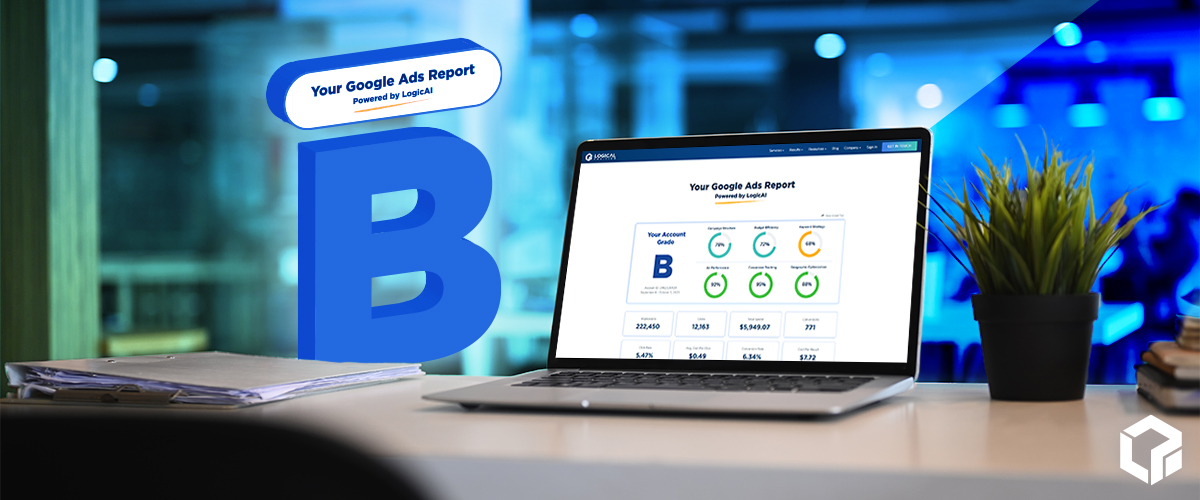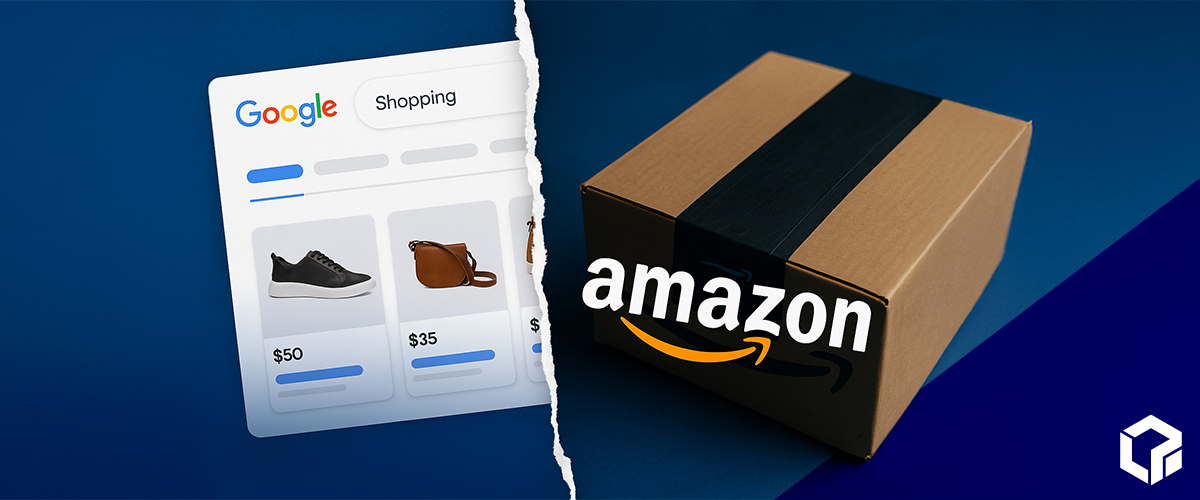Google Ads is easily be one of the most powerful pay-per-click platforms out there, but it’s not without complexity.
With hundreds of different sections and tabs to pay attention to and a thousand more metrics to keep in mind, trying to create an effective campaign can tie you up for hours; however, a well-executed paid search campaign can help you reach potential customers with the right message, in the right place, and at the right time.
An effective Google Ads campaign can be crucial to a business’s overall bottom line. Of course, messaging and target audience are unique for each company, but there are some basic strategies that work consistently in Google Ads campaigns, regardless of the industry.
While there is no silver bullet to creating a productive and healthy ad campaign, you can adjust a few levers and maximize your outcomes with these four Google Ads tips.
Tip #1. Understand (And Possibly Forgo) Keywords
Google Ads relies heavily on user intent through keywords. This means whenever someone types a search in Google, ads are displayed based on how relevant the algorithm considers the search term to be for specific ad campaigns.
In a typical campaign, you’ll come come across four possible “keyword matches” or ways that you can “tell” Google to handle the keywords that you bid on:
- Exact Match. Traditionally, this keyword modifier meant that your ads would only be shown with the exact search term you input. However, Google has adjusted the match to display your ads for things like plural versions of the word, misspellings, or interchangeable keywords for what you have specified in your campaign.
- Phrase Match. This modifier is quite similar to the exact match—your ad will only be shown when users search for the exact phrase you specify. The search query must include all of the noted keywords, in the exact order you input them.
- Broad Match. The Broad modifier will match searches with any words (including synonyms), in any order that includes any of the keywords in the phrase you’re bidding on.
- Broad Match Modified. Unlike the standard Broad Match, the Broad Match Modified tells Google that the search query must include all of the targeted keywords, but in any order of placement.
Each of these keyword match-types presents a trade-off between relevancy, cost, and impressions.
For example, Broad Match will yield the greatest number of impressions with the lowest CPC but will match your ad with a number of irrelevant searches. On the other hand, Exact Match will produce the lowest number of impressions at a higher CPC but will lead to higher relevancy and a better click-through rate.
If you aren’t sure which keyword match-types and budgets will produce the best results, consider working with Google Ads experts and/or using a specialized ad automation tool to make your life easier.
If you’re a client of Logical Position, you’re already benefitting from the insights and optimizations of Ampd, but it’s available (for free) to use, eliminating 90% of the effort in the manual process of launching and managing your ad campaigns. And as a bonus, Ampd will actually scan your website and optimize your ads based on your website content—forging your management of keywords completely.
Tip #2. Reach Beyond Your Primary Language
World globalization didn’t go unnoticed in the PPC world. The numbers speak for themselves: one in five U.S. residents use a language other than English at home, and, chances are, they use a different language when entering Google searches.
In the context of Google Ads tips, this means that it is time to take a closer look at your campaign’s language targeting settings.
Remember, Google Ads bases its targeting on the interface language of a Google user. For example, if somebody’s preferred language is Spanish, they will only be served ads targeted to Spanish speakers, even if the search is completed from the US version of the search engine.
To expand your advertising efforts to a broader audience, you need to simply identify the languages that are most prominent in your target geographic areas and include them in your language targeting settings. It’s that simple!
This trick isn’t aimed to attract specifically non-English speakers, instead, it helps you connect with a bilingual audience or people who may be using a non-English browser but will still respond to ads written in English.
Tip #3. Optimize For Conversion
A landing page is truly one of the most overlooked aspects of PPC campaigns.
It is easy to get lost in looking for Google Ads tips, testing ad copy, tweaking bids, and putting all your efforts into the advertising platform itself. However, don’t forget about the ultimate goal of your ad campaign: making a sale.
As soon as a user clicks on your ad, they move on to your landing page or store, but it is only half of your ad campaign’s success. Now, it is up to the content where the user lands to finish the job and make that conversion happen.
To optimize your landing page for Google Ads conversions, you need to make sure that your landing page message aligns with the massage of your ads. Make sure to maintain consistency between your ad copy, keywords, and CTA, since you already know that your customers are interested in the message presented by your ad, you can increase conversion rates by presenting the same message throughout the process.

Final Thoughts
While tricky at the first sight, a properly managed and maintained PPC campaign that follows the best Google Ads tips can help your business to drastically increase its revenue in no time—and Logical Position and Ampd are here to help.




